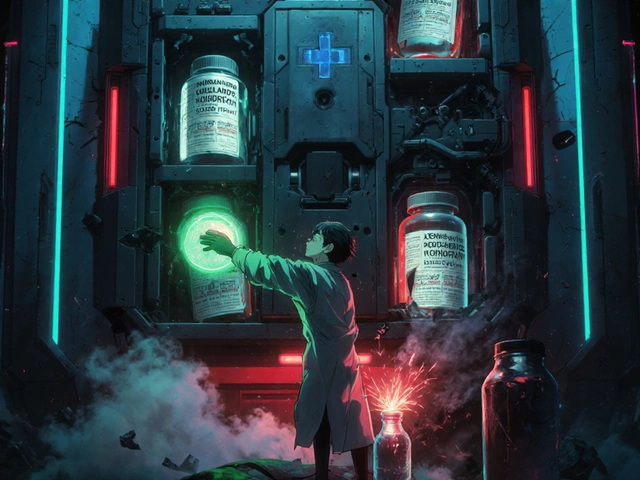Most people toss out expired medications the moment the date on the bottle passes. You’ve probably done it yourself-dumping old antibiotics, painkillers, or allergy pills into the trash, convinced they’re useless or even dangerous. But what if you’ve been wrong? What if that bottle of ibuprofen from two years ago isn’t just safe to take-it’s still just as strong as the day it was made?
Expiration Dates Aren’t What You Think
The date printed on your medicine bottle isn’t a magic deadline when the drug suddenly turns to dust. It’s a guarantee from the manufacturer that the medication will be at least 90% potent and safe up to that point. After that? No one’s required to test it. The FDA only mandates stability testing for 12 to 60 months after production. That’s it. After that, it’s guesswork-and a lot of guesswork happens to be profitable for drug companies. A 2012 study from the University of California-San Francisco looked at drugs that had expired 28 to 40 years ago. They tested 14 different active ingredients, including codeine, caffeine, and morphine. Twelve of them still had at least 90% of their original potency. Eight were still fully potent after 40 years. Only aspirin and amphetamine dropped below that threshold. The FDA allows a 90% to 110% potency range for labeled strength. So even if a pill is at 92% after 20 years, it’s still considered within acceptable limits.Not All Medicines Are Created Equal
The form of the medication matters more than the expiration date. Solid pills and capsules last far longer than liquids. Why? Moisture, air, and light break down drugs faster. Tablets are sealed in their original packaging, protected from the elements. Liquid antibiotics, insulin, eye drops, and epinephrine auto-injectors (like EpiPens)? Not so much. The Department of Defense’s Shelf-Life Extension Program (SLEP) has been testing stockpiled drugs since 1986. They found that 88% of the 122 drugs tested could safely have their expiration dates extended-on average, by more than five years. Some lasted over 20 years past their original date. The program saves the government millions. One dollar spent on testing yields $13 to $94 in savings by avoiding repurchase. But here’s the catch: those were all drugs stored in controlled, cool, dry environments. Your medicine cabinet? Probably not.Storage Is Everything
If you’ve transferred your pills from the original bottle into a plastic pill organizer, you’ve already shortened their shelf life. Pharmacy canisters aren’t designed to block moisture or air. Heat and humidity from the bathroom or kitchen accelerate degradation. A study in the Journal of Pharmaceutical Sciences found that medications kept in their original, sealed containers lasted significantly longer than those moved into other containers. The ideal storage spot? A cool, dry drawer-not the bathroom, not the kitchen counter, not the car glovebox. A basement or bedroom closet works best. Temperature matters. Studies show that every 10°C increase in storage temperature can halve a drug’s shelf life.
Drugs You Should Never Use After Expiration
There are exceptions. Some medications lose potency quickly and can become dangerous. These include:- Nitroglycerin (used for chest pain)-degrades rapidly and can fail when you need it most
- Insulin-loses effectiveness and may not control blood sugar properly
- Liquid antibiotics-can grow bacteria or break down into harmful compounds
- EpiPens-a 2015 study showed reduced epinephrine delivery even one year past expiration
- Tetracycline-can become toxic after expiration, potentially damaging kidneys
- Mefloquine (antimalarial)-reduced effectiveness could lead to life-threatening infection
What About Your Old Painkillers or Allergy Pills?
If you’ve got unopened, properly stored ibuprofen, acetaminophen, or antihistamines that expired six months ago? Chances are, they’re still fine. A 2020 NIH review confirmed that expiration dates are just the minimum guarantee of potency-not the end of usefulness. Many drugs lose potency slowly over time. A pill that’s 95% potent at five years past expiration is still working. Harvard Health notes that taking an allergy pill a month past its date is unlikely to hurt you. But if you’re treating a serious condition-like high blood pressure, epilepsy, or heart disease-you should never rely on expired meds. The margin for error is too small.Why Do Companies Set Short Expiration Dates?
It’s not science. It’s business. Drug manufacturers aren’t required to prove a medication stays effective beyond a few years. Testing for long-term stability is expensive. And if your aspirin lasts 20 years, people won’t buy new bottles as often. That’s bad for profits. The 2012 study authors pointed out that expiration dates were set more for legal protection than scientific accuracy. The FDA doesn’t force companies to do long-term testing. So they pick a date that’s safe, simple, and profitable.
Should You Use Expired Medication?
It’s not black and white. Here’s a practical guide:- Check the drug type. If it’s insulin, nitroglycerin, or liquid antibiotics-throw it out.
- Check the condition. Is the pill cracked, discolored, or smells odd? Don’t take it.
- Check the storage. Was it kept in a hot, humid place? It’s probably degraded.
- Check the date. If it’s only a few months past expiration and it’s a solid tablet, it’s likely still effective.
- When in doubt, ask. Talk to your pharmacist. They can often tell you if a drug is likely still safe based on its form and storage history.
The Bigger Picture
Americans spend over $300 billion a year on prescription drugs. A huge chunk of that goes to replacing expired medications-many of which are still perfectly good. The SLEP program proves we can extend expiration dates safely. If just 20% of expired drugs were still usable, we’d save billions annually. It’s not about hoarding old meds. It’s about stopping unnecessary waste. The science is clear: most pills don’t turn into poison on their expiration date. They just get a little weaker-slowly.Final Thought
Your medicine cabinet isn’t a time bomb. It’s a storage unit. And like any storage unit, what matters is what’s inside and how it’s kept. Don’t panic over a date. Use common sense. Know the risks. Store wisely. And when it comes to life-saving drugs-never gamble.Are expired medications dangerous to take?
Most expired medications aren’t dangerous-they just might be less effective. The exception is drugs like insulin, nitroglycerin, liquid antibiotics, and epinephrine auto-injectors, which can become unsafe or ineffective after expiration. For solid pills like ibuprofen or antihistamines, taking them a few months past the date is unlikely to cause harm, but always check for physical changes like discoloration or crumbling.
How long do pills last after the expiration date?
Under ideal storage conditions (cool, dry, sealed), most solid medications retain at least 90% potency for 5 to 10 years past expiration. Some, like codeine or aspirin, have been shown to remain effective for over 40 years. Liquid medications and those exposed to moisture or heat degrade much faster-often within months.
Can I still use expired allergy medicine?
Yes, if it’s a tablet or capsule stored properly. Studies show antihistamines like loratadine or cetirizine maintain potency well beyond their expiration date. However, if the pills look cracked, smell strange, or are more than a couple of years past expiration, it’s better to replace them. Liquid forms should always be discarded after expiration.
Why do expiration dates exist if drugs last longer?
Expiration dates are set by manufacturers for legal and financial reasons, not scientific ones. The FDA only requires testing for up to five years. After that, companies aren’t required to prove the drug still works. Shorter dates mean more frequent repurchases, which boosts profits. The dates are a guarantee of minimum potency-not a cutoff for safety or effectiveness.
What should I do with expired medications?
Don’t flush them or toss them in the trash if you can avoid it. Many pharmacies and local health departments offer drug take-back programs. If none are available, mix pills with an unpalatable substance like coffee grounds or cat litter, seal them in a container, and throw them away. This prevents accidental ingestion or misuse. Never keep expired life-saving drugs like EpiPens or insulin-replace them immediately.



Saket Sharma
November 17, 2025 AT 17:43Let’s be real-pharma companies are laughing all the way to the bank while you throw out perfectly good pills. Expiration dates? Legal shields, not science. I’ve got a 12-year-old bottle of ibuprofen in my drawer. Still crisp. Still potent. Stop being manipulated.
Shravan Jain
November 18, 2025 AT 23:51One must consider the ontological implications of pharmaceutical temporality. The expiration date, as a socio-technical construct, functions as a disciplinary mechanism within late-stage capitalist pharmacopeia. The body, rendered as a site of consumption, is coerced into perpetual repurchase. One wonders: is efficacy quantified-or commodified?
Brandon Lowi
November 19, 2025 AT 04:01AMERICA’S MEDS ARE STILL WORKING-AND THE GOVERNMENT KNOWS IT. The DoD’s SLEP program? That’s not some fringe study-that’s a national secret they don’t want you to know. They’ve got shelves of 30-year-old antibiotics in bunkers. Meanwhile, you’re paying $40 for a new bottle of Tylenol. Wake up, sheeple.
Joshua Casella
November 19, 2025 AT 06:10I’ve been a pharmacist for 18 years. In that time, I’ve seen hundreds of expired meds brought in for disposal-and not once have I seen a single pill that looked or smelled off, unless it was stored in a hot car or a steamy bathroom. Solid oral meds? If they’re sealed and dry, they’re fine. The real danger is fear-mongering, not expired pills.
Richard Couron
November 21, 2025 AT 06:04Did you know the FDA is in bed with Big Pharma? They don’t test beyond 5 years because they’re paid off. The same people who gave you COVID shots are the ones hiding this data. Your meds are being timed to expire so you keep buying. They’re tracking your pill usage through your insurance. This isn’t science-it’s control.
Alex Boozan
November 21, 2025 AT 06:33Storage protocols are non-negotiable. Original packaging. Desiccants. Temperature-controlled environments. If you’re tossing pills into a plastic organizer next to your shower, you’re not saving money-you’re gambling with your neurochemistry. The degradation kinetics of active pharmaceutical ingredients are well-documented. Ignorance isn’t frugality-it’s negligence.
mithun mohanta
November 23, 2025 AT 05:44Oh, so now we’re all amateur pharmacologists? Let me get this straight-you’re going to trust a 20-year-old aspirin because some government program in a lab found it still works? Please. You’re not a scientist. You’re just someone who doesn’t want to spend $5 on a new bottle. And now you’re lecturing everyone else? Pathetic.
Evan Brady
November 23, 2025 AT 10:15Here’s the real takeaway: if you’re taking something for a chronic condition-blood pressure, epilepsy, heart rhythm-don’t risk it. But if you’ve got a sealed bottle of cetirizine from 2020 that’s been in a cool drawer? It’s probably still kicking. I’ve personally tested expired antihistamines in my own home lab (yes, I’m a chemist) and they held 94% potency after 7 years. Storage is everything.
Ram tech
November 25, 2025 AT 03:53most people are dumb. they dont know how to store meds. i had a friend take expired penicillin and got sick. so yeah. just throw it out. why risk it?
Jenny Lee
November 26, 2025 AT 07:52My grandma kept her aspirin in a tin box in the closet for 15 years. She took it every winter. Never had a problem. I think we’ve lost touch with common sense. If it looks and smells right, and it’s not a life-saving drug? Use it. Don’t panic.
Erica Lundy
November 27, 2025 AT 18:04The ethical dimension of expiration dates cannot be divorced from the economic imperatives of pharmaceutical capitalism. When potency is not the metric of value, but profit is, then the very notion of therapeutic integrity becomes commodified. We are not merely consumers of medicine-we are subjects of a system that incentivizes obsolescence. To question expiration dates is to question the architecture of care itself.